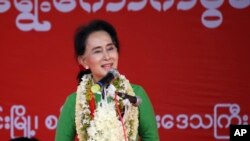Myanmar's election oversight body has decided to proceed with the general election, as scheduled, next month, according to a government announcement Tuesday evening.
"After reviewing statements from committee members about the pros and cons of postponement of election date, the Union Election Commission has decided to hold the general election on the previously scheduled date, November 8, without making any changes," said an announcer on military-run Myawaddy television.
The Union Election Commission (UEC) notice was also posted on the Ministry of Information's Facebook page.
Earlier in the day, UEC officials pressed the nation’s major political parties to postpone national polls scheduled for Nov. 8, citing recent natural disasters. Aung San Suu Kyi's National League of Democracy (NLD) was the only party present at the emergency meeting in Naypyidaw that objected, according to party officials.
"I responded to the UEC that the 2008 constitutional referendum was even held a few days after Cyclone Nargis, which killed more than 100,000 people,” NLD central executive committee member Win Htein told VOA. “The present natural disasters are not as severe compared to Nargis. That’s why we absolutely opposed the postponement of the election date."
The election commission cited recent flooding disasters that killed more than 100 people in Harkar in Chin State and Kawlin in the Sagaing Region as reasons forcing a delay.
Approximately 1.6 million people have been “critically affected” by flooding in Myanmar in recent months, according to government agencies and the U.N.’s Office for the Coordination of Humanitarian Affairs.
The Union Solidarity Party, the Farmers’ Development Party and the National Development Party backed the election commission’s proposal to delay the polling. Observers said three other parties said they would leave the matter up to the election commission. Several other ethnic-based parties invited to the emergency meeting did not attend.
The election commission earlier announced that balloting on November 8 would not be held in hundreds of villages in the predominantly Kachin and Shan ethnic areas where armed groups continue to resist state control.
There is speculation that an underlying motivation for a nationwide postponement was political.
Many political analysts predict the pro-democracy opposition NLD — longtime nemesis of Myanmar's dominant military-run government — is predicted to make major gains in the upcoming election.
NLD's Nobel Prize laureate Suu Kyi, speaking at a campaign rally near Yangon on Saturday, warned supporters to be vigilant on election day because “there may be those who intentionally orchestrate riots.”
The NLD secured 80 percent of the legislative seats in the 1990 election, but results were nullified by the military, which refused to hand over power and then put Suu Kyi under house arrest for years.
This November's poll would be the first general election since a nominally civilian government was installed in 2011. But, with the military still firmly in control of the process, there has been widespread speculation about whether the election can be free and fair.
Under Myanmar law, the next election needs to be held between 30 and 90 days prior to the next parliamentary session convening, which is set for January 30.
More than 6,000 people have filed to run for positions in the national parliament and regional legislatures. However, at least 75 independent or opposition party candidates were disqualified, many because of the citizenship status of their parents.
Among them are about 15 of 18 candidates from the Democracy and Human Rights Party, a Muslim majority party whose candidates tried to run in the Rakhine state constituencies.
Additional reporting by VOA Burmese Service.





